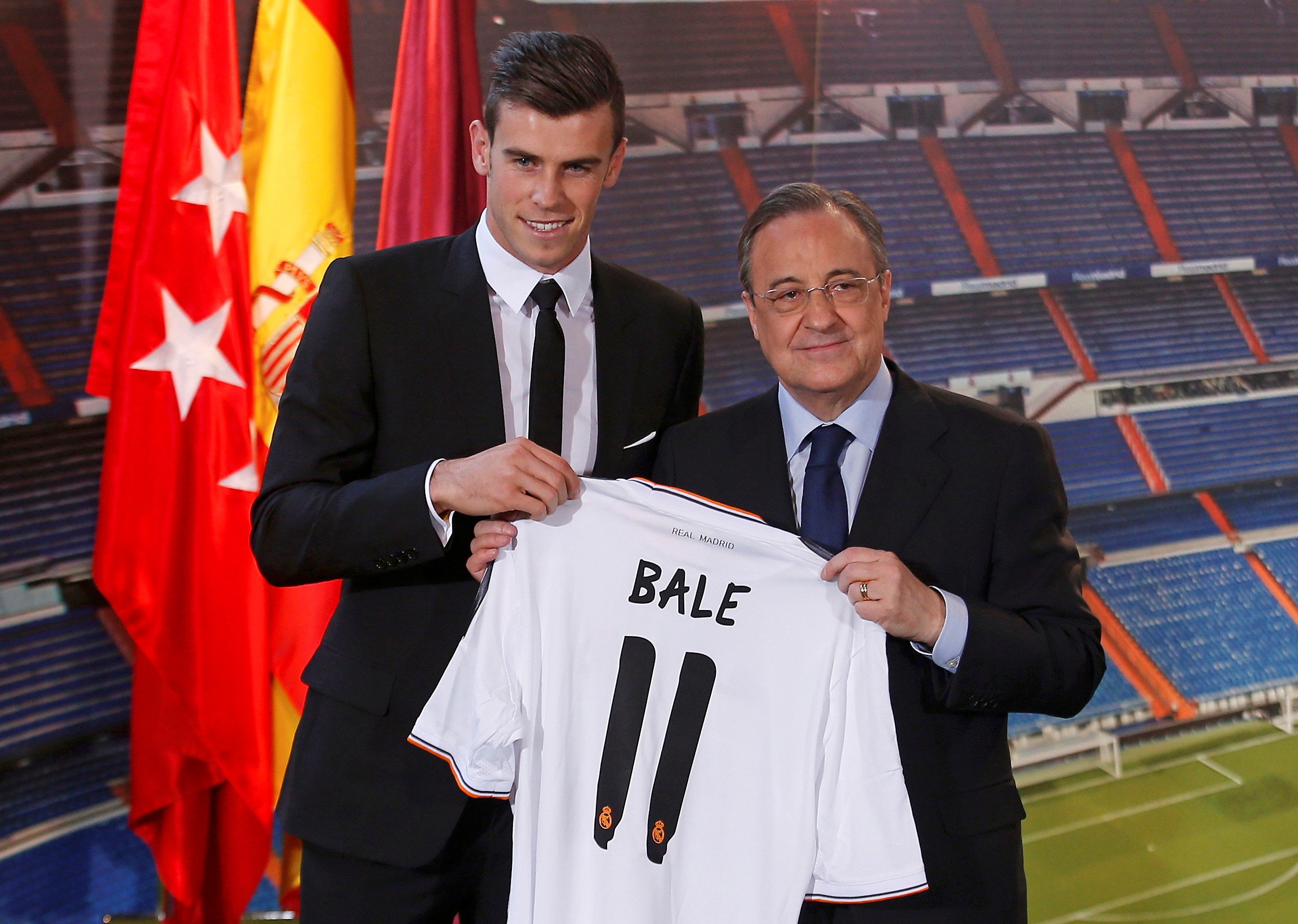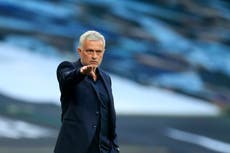Gareth Bale leaves behind his quiet and successful life in Madrid amid a whole lot of anger
Gareth Bale is returning to the Premier League and his former club Tottenham on a one-year loan from Real Madrid after a turbulent seven years in Spain

The smile on Gareth Bale’s face when he discusses Tottenham Hotspur represents quite the contrast to the image some of his Real Madrid teammates have of him. They privately refer to him now as a “caradura”. The literal translation is “hard-face”, although the meaning is probably closer to “brass neck”. That’s how open the dissatisfaction with him has got at Madrid.
It is strange for a generally quiet man, but also a little sad for a player that has won four Champions Leagues at the club, scored three goals in two different finals – including two match-winners and perhaps the greatest goal the competition has ever seen – as well as two Spanish league titles.
That is a record that should make Bale one of British sport’s greatest ever exports. And yet the impression, as he temporarily leaves, is of a Brit abroad who has failed to settle or fully fulfil his talent.
That impression isn’t completely correct, but the very debate points to the complications of his time in Spain.
There were politics to his Madrid career from the start, a situation that can be customary for the biggest club in the world. The legacy of Real Madrid presidents is built on Champions Leagues wins and big signings, and it has always rankled Florentino Perez – the all-powerful current incumbent of the role – that he hadn’t been the one to secure the signing of Cristiano Ronaldo in 2009. That, problematically, was predecessor Ramon Calderon.
Bale was supposed to be Perez's Ronaldo. Like the Portuguese, Bale had been the PFA player of the year, ripping up the Premier League in sensational fashion. Like the Portuguese, he had a game built on power married with talent, that made him close to unstoppable when on form.
It is why Spurs fans are naturally so delighted to have him back. It was the source of so many great moments and victories, most of all that astonishing overhead kick that secured the 2018 Champions League against Liverpool.
Ronaldo celebrated that goal with Bale but, minutes later, threw his hands to the air in fury when Bale didn’t pass to him for an open goal. Scrutiny on this became a theme of the Welsh international’s time in Spain. There was constant focus on their relationship and particularly Ronaldo’s behaviour on the pitch.
It says much that, when Bale signed for Madrid in 2013, English press reported it as a world-record £83.5m but Madrid maintained it was only £77m. The reason was because the former would take it above Ronaldo’s fee when he signed from Manchester United in 2013. The Spanish club wanted to placate his ego. Ronaldo was to remain the club's most valuable player, in price as well as status.
While Bale never won the Ballon d’Or in the manner that Perez had predicted, he did hit as many Champions League final goals as Ronaldo. He just never had the status or, by that point, the guaranteed starting place.
After that 2018 final in Kiev, Bale openly said he wanted to leave Madrid as he wanted to play more regularly. Such public dissent was seen as a final straw for manager Zinedine Zidane, himself a legend for the club as a player. Their curious relationship is the core reason it all soured for Bale at Madrid.
It’s hard to say why it went so wrong with Zidane. There was no big fallout. There was no great controversy. There was, however, a lot of noise for someone that is actually so quiet.
This is where some of the accusations that Bale failed to settle are unfair.
He was perfectly happy in Madrid. His critics might say this was precisely why he refused to go anywhere else despite not playing, since life in the city came with a £600,000-a-week contract. Nevertheless, anyone looking for any kind of controversy would be disappointed.
Bale lived in the exclusive area of La Finca, where a lot of players have houses. His daughters went to school at British Council and enjoyed gym classes nearby. Bale himself liked the local jamon, one of few indulgences. The fact people bring this up as relevant detail about him shows how "boringly quiet" – in the words of one source – his life in Madrid has been.
Contrary to perception, the 31-year-old can speak Spanish, and gets involved in the dressing-room chatter. Most of his teammates have liked him for most of his time there. It should also be noted that Ronaldo once made a point of defending him in a press conference. The Portuguese would have found a kindred spirit in someone who trained as hard as he did and was as professional as he was.
That might have actually started to cost Bale.
The Welsh international used to skip the late-night squad dinners that are a Spanish custom because he wanted to be in bed by 11pm. He preferred to save any energy for golf, a game he loves as much as football, but that would eventually represent a problem.
If Bale’s refusal to join squad dinners affected his connection with teammates, he never had a connection with Zidane.
They just never clicked from when the French star took over as manager halfway through the 2015-16 season. Zidane, in contrast to Rafa Benitez and Carlo Ancelotti, didn’t think Bale was committed. Some around the club theorise that it was because Bale was a Perez protege. Zidane and the president have always had a complicated relationship themselves, and the French manager is one of the few people at the club who holds power independent of Perez.
The issue was that the lack of connection between the two began to become something more concrete. Zidane started to drop Bale more and more. He has not played 30 league games in a full season under the French manager, let alone started 30 league games. When Bale couldn't play one game against Spurs, coincidentally, he went golfing instead. Zidane couldn't understand how someone so good at football didn't seem to have the interest to match.
Injuries didn’t help, it must be said, and there have been some questions whether Bale can consistently be the same player at 31.
In terms of mentality, though, many at the club felt he began to disengage. This is what began to turn some teammates off him, too. Those who defend Bale would argue disengagement is natural when your manager says things like “if he goes tomorrow, so much the better”. Bale also became a regular focus of criticism for the intense Spanish media. Stories were leaked about how he was only concerned with playing golf. One source quipped: "They'll have to find a new villain now."
The media would focus on his apparent detachment, like at a recent game when he put his Covid mask over his eyes and seemed to be asleep. In that regard, Bale probably didn’t help himself.
A nadir came when Wales qualified for Euro 2020 and he held up a banner passed around during celebrations with the words: “Wales. Golf. Madrid. In that order.”
It was a joke but the Spanish club, and their fans, didn’t see the funny side.
Many supporters and pundits had previously pointed to his big-game record and big goals, but now they stopped defending him. In fairness, Bale stopped offering such moments. He rarely had the chance.
Throughout all of this was a stand-off with the club about his future, in what was almost a classic golden handcuffs situation. Bale wanted to leave, but wanted to do so on his terms, and didn’t want to give up the terms of that lavish contract. That scuppered a few Madrid sales, including a deal with China’s Jiangsu Suning which fell through.
For his part, Bale was not interested in going to what would be considered a second- or third-tier league like China at this point in his career. That cuts across the image that has spread in Spain of a player who is more interested in huge wages than playing. Those close to Bale would say the stand-off is only about a point of principle.
His agent, Jonathan Barnett, hasn’t enamoured himself with Madrid of late. Now, the desire to get rid of him at the Bernabeu is unanimous. Even Perez agrees it’s time. Zidane “just doesn’t want to see Bale around”.
It is why they have agreed to this deal where Bale keeps the same contract, and Madrid pay 60% of his wages. That’s how bad it’s got, that’s how soured it’s become.
And yet it’s still just a loan. He is still set to return to Madrid next summer. His time as British football’s most complicated export isn’t over yet.
Join our commenting forum
Join thought-provoking conversations, follow other Independent readers and see their replies
Comments

Bookmark popover
Removed from bookmarks